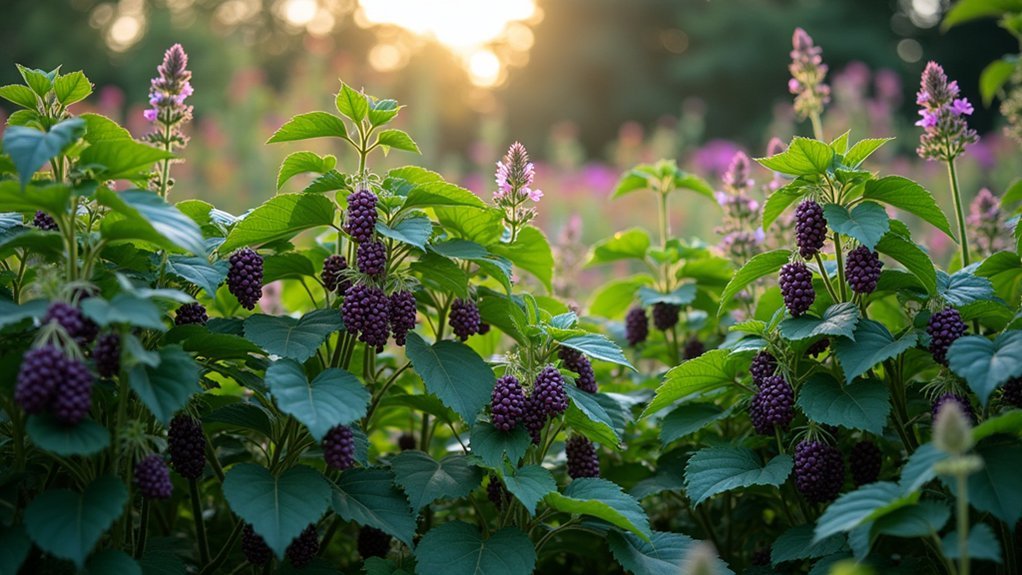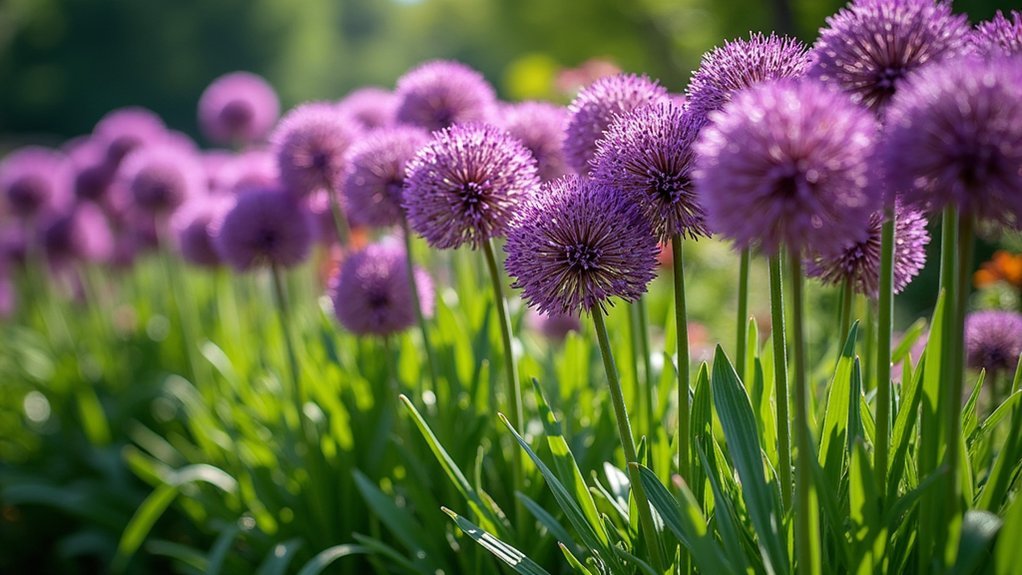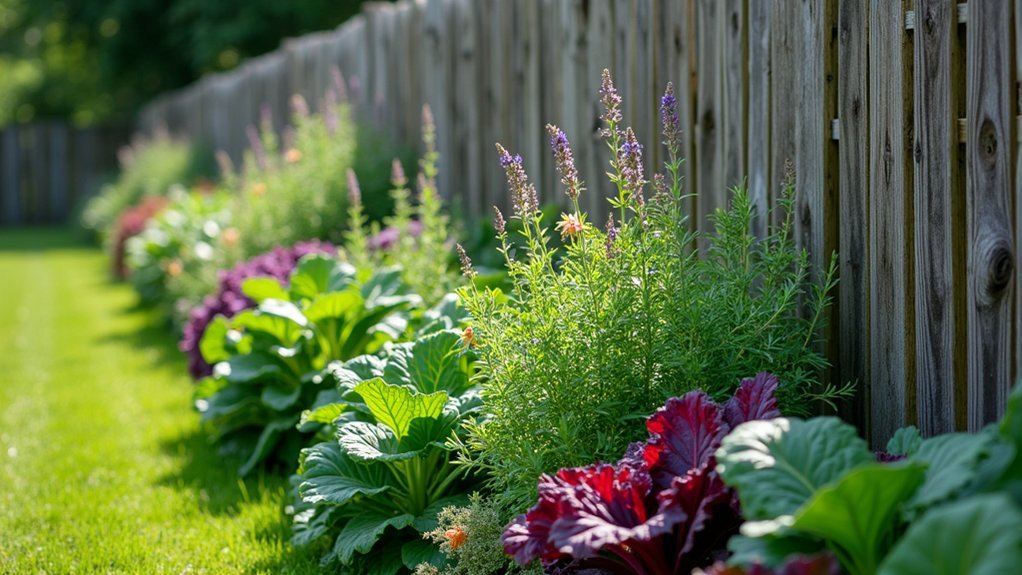Create a deer-resistant edible fence with pungent herbs like rosemary, thyme, and sage along your garden perimeter. Plant alliums such as garlic, onions, and chives to establish strong-scented barriers deer avoid. Add thorny blackberries or raspberries for physical protection while providing delicious harvests. Include nightshade family plants like tomatoes and peppers that naturally repel deer. Fuzzy-leaved vegetables like cucumbers and squash create additional deterrents. The right combination offers both protection and productivity for your garden.
Aromatic Herbs That Deter Deer and Define Boundaries
Gardeners seeking dual-purpose solutions will find aromatic herbs to be ideal fence plants. Strong-scented varieties like chives, dill, and garlic naturally deter deer while adding flavor to your kitchen creations. Their pungent oils trigger deer’s sensitive noses, creating an invisible barrier around your precious plantings.
Create a functional boundary by planting robust herbs such as rosemary and thyme along garden edges. These aromatic herbs not only establish clear borders but also invite beneficial pollinators while keeping deer at bay.
For enhanced protection, incorporate fuzzy or prickly-textured options like sage and lavender into your deer-resistant garden. Regular trimming intensifies these herbs’ scents, strengthening their effectiveness.
Prickly Vegetables and Fruits for Natural Garden Barriers
While creating a delicious defense system, you’ll find that prickly vegetables and thorny fruits offer the perfect dual solution for deterring deer. The prickly leaves and thorny textures create natural barriers that deer typically avoid, while still providing you with edible harvests.
| Plant Type | Deer Resistant Benefits |
|---|---|
| Cucumbers & Squash | Fuzzy, prickly textures deter browsing |
| Blackberries & Raspberries | Thorny fruit plants with protective canes |
| Eggplants & Peppers | Prickly varieties establish defensive perimeters |
| Root Vegetables | Require digging, creating a protective layer |
Enhance your garden’s protection by incorporating strong-scented herbs with deer resistant vegetables. Rosemary and sage varieties not only repel deer but also complement your edible fruit barriers while adding culinary value to your protective landscape.
Nightshade Family Plants as Protective Garden Borders

Although deer typically devour many garden favorites, the nightshade family offers a delicious deterrent that serves double duty in your landscape.
Tomatoes, eggplants, and peppers contain compounds toxic to deer, making them excellent choices for protective garden borders.
You’ll find these nightshade family plants not only shield your vulnerable crops but also provide a bountiful harvest. Their strong scents mask the appealing aromas of deer-friendly plants, reducing overall deer damage to your garden.
Plant these easy-to-grow vegetables in full sun around your garden’s perimeter. The aromatic foliage creates an invisible barrier that most deer won’t cross, while you enjoy the fruits of your clever planning.
This strategic approach combines effective deer deterrence with edible rewards—a win-win solution for hungry gardeners.
Root Vegetables With Deer-Resistant Foliage for Fence Lines
Despite their reputation as garden pillars, many root vegetables offer an unexpected benefit as natural deer deterrents along fence lines. Beets and carrots develop foliage with textures and flavors deer typically avoid, making them strategic choices for vulnerable garden borders.
While deer may be attracted to the tops of some root vegetables, they’ll generally ignore the bulbs underground if alternative food sources exist. You’ll find that plants with fuzzy or prickly leaves create particularly effective barriers against browsing deer.
For maximum protection, surround your root vegetables with strongly-scented companions like chives or dill. This aromatic partnership enhances the deterrent effect and creates a more robust defense system.
Strong-Scented Alliums That Create Living Fence Barriers

When strategically planted along your property’s perimeter, pungent alliums serve as one of the most effective natural deer deterrents available to gardeners.
These strong-scented alliums create living fences that discourage deer browsing while contributing edible harvests to your kitchen.
Plant garlic, onions, leeks, and chives in dense rows to establish a deer-proof boundary that naturally protects your more vulnerable crops.
You’ll find these versatile plants adapt well to various soil conditions, requiring minimal maintenance while providing maximum protection.
Beyond their deer-repelling qualities, alliums attract beneficial insects and pollinators, enhancing your garden’s overall health.
Their potent aroma masks the scent of tempting plants behind them, allowing your entire garden to flourish without constant deer damage or the need for unsightly physical barriers.
Frequently Asked Questions
Are There Any Vegetable Plants That Deer Won’t Eat?
Yes, deer typically won’t eat strong-smelling vegetables like onions and garlic, prickly plants like cucumbers, nightshade vegetables such as tomatoes, and root vegetables like carrots when other food is available.
What Plant Do Deer Hate the Most?
Deer hate garlic the most due to its strong, pungent scent. You’ll find they’ll avoid your garden entirely when you plant garlic borders. Other strong-smelling herbs like chives and onions work similarly well.
Are There Any Flowers That Deer and Rabbits Won’t Eat?
Yes, you’ll find deer and rabbits typically avoid flowers with strong scents like marigolds and lavender, prickly textures like Russian sage, and toxic varieties like foxglove and monkshood. They’ll usually bypass snapdragons and bee balm too.
What Smell Do Deer Absolutely Hate?
Deer absolutely hate the smell of garlic, onions, leeks, chives, and strong herbs like dill. You’ll find they’re repelled by these pungent odors, especially when coming from fuzzy or prickly plants they dislike touching.
In Summary
You’ve now discovered multiple ways to build edible boundaries that deer won’t devastate. Whether you’re planting aromatic herbs, prickly vegetables, nightshade family members, deer-resistant root crops, or pungent alliums, you’ll enjoy both protection and productivity. Remember, no plant is completely deer-proof, but these options will discourage browsing while defining your garden spaces. You’re now equipped to create living fences that serve double duty—feeding you instead of wildlife.




Leave a Reply